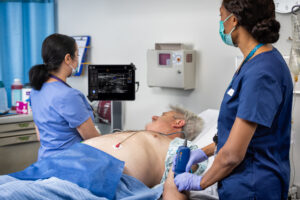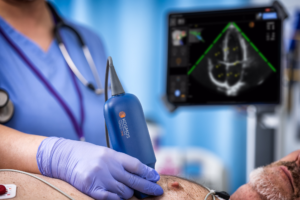Unveiling the Potential of Femoral Vein Doppler in Critical Care:
Exploring the Research of Dr. Vimal Bhardwaj

Dr. Vimal Bhardwaj
MD
Meet Dr. Vimal Bhardwaj
Dr. Vimal Bhardwaj is a cardiac intensivist at Narayana Health in India, specializing in critical care at the Mazumdar Shaw Medical Center in Narayana Health City, Bengaluru. With over ten years of clinical experience, Dr. Bhardwaj serves as a faculty member to various national-level Continuing Medical Education (CME) programs, such as National Cardiac Life Support.
Additionally, Dr. Bhardwaj is the Director at IKannekt Biomedical Research Private Limited, where he furthers his commitment to advancing healthcare through research and development initiatives.
Beyond his clinical practice and research endeavors, Dr. Bhardwaj demonstrates a passion for clinical innovation. Notably, he holds a patent for his design of a CPAP Hood device and patent in automatic tube block detection technology.
Research on Femoral Vein Doppler (FVD)
In critical care medicine, innovation often stems from keen observation and practical application. Dr. Bhardwaj’s groundbreaking research on Femoral Vein Doppler (FVD) exemplifies this ethos, offering a fresh perspective on assessing right heart function and venous congestion.
FVD offers valuable insights into assessing right ventricular afterload and signs of venous congestion, providing a simpler alternative to the multi-step VExUS score. While the VExUS score relies on multiple parameters, such as IVC diameter, hepatic venous Doppler, portal vein pulsatility, and renal vein Doppler, FVD offers a more straightforward approach. However, more data on the relationship between FVD and the VExUS score needs to be provided, prompting further investigation into their correlation.
A fundamental observation in clinical practice piqued his interest in FVD. “Despite veins housing 70% of blood volume, there’s been more focus on arterial side issues,” he notes. This realization catalyzed his exploration into a novel diagnostic approach that could fundamentally change patient care.
Through rigorous research, Dr. Bhardwaj has validated the diagnostic efficacy of FVD. According to his research, “Femoral Vein Doppler was more sensitive than VExUS in assessing venous congestion, correlating 86% with Doppler,” he noted. This validation underscores FVD’s potential as a highly useful tool in critical care settings, offering swift and reliable evaluations of right heart function.
The simplicity of FVD adds to its allure as an innovative diagnostic tool. He emphasizes its ease of use: “In at least 9 out of 10 cases, it’s very easy to visualize something.”
As Dr. Bhardwaj’s research has unfolded, the implications of FVD on patient management have become increasingly apparent. With its potential to transform clinicians’ assessment and management of critical conditions, FVD represents a significant leap forward in the quest for innovative diagnostic methodologies.
Incorporating FVD into Patient Management
Integrating new technologies is pivotal in advancing clinical care as patient management practices continue to evolve. “The simplicity of FVD makes it a promising addition to the critical care toolkit,” Bhardwaj said. The straightforward approach and diagnostic accuracy of FVD make it accessible to clinicians of all experience levels.
After 5 to 10 supervised cases, clinicians can confidently use FVD in their diagnostic routines, facilitating swift and reliable assessments of right heart function and venous congestion. This focus on ease-of-use underscores FVD’s utility in critical care settings.
The practical benefits of incorporating FVD into patient management also include diagnostic efficacy. Dr. Bhardwaj’s validation of FVD’s diagnostic usefulness for venous congestion and right heart function showcases its reliability.
As clinicians explore innovative approaches to patient care, adopting technologies like FVD holds promise for enhancing clinical practice.
Future Implications of Reseach
Dr. Bhardwaj sees a bright future for patient care and treatment thanks to ongoing research on diuretic management and ultrasound. In his view, ultrasound offers a new level of precision in diuretic management. “Using ultrasound, we can precisely manage diuretics by evaluating parameters of illness condition, thus improving patients’ quality of life,” he explained.
In Bhardwaj’s view, accurate diagnosis of conditions like right heart failure is vital, particularly in post-cardiac surgical patients. He said, “Research on Doppler and sepsis offers insights into volume overload states commonly seen in septic shock patients.”
This research is not limited to diuretic management and ultrasound. Dr. Bhardwaj also highlights the emerging topic of de-resuscitation and the significance of establishing precise endpoints for this practice.
“We can develop protocols and even artificial intelligence algorithms to predict patients by integrating physiological correlations,” he noted.
This approach considers parameters like predicting Acute Kidney injury, renal resistive index, and volume condition to determine the need for interventions such as dialysis. The implications of this research are vast, and Dr. Bhardwaj anticipates significant advancements in the field in the next few years.
Overall, Bhardwaj sees a bright future for patient care and treatment thanks to ongoing research on topics including diuretic management and ultrasound. Using ultrasound, physicians can provide timely treatment and improve patient outcomes by accurately diagnosing conditions like right heart failure and volume overload states. With the emerging topic of de-resuscitation, providers can establish precise endpoints for de-resuscitation, improving patients’ quality of life.
Stay posted for our full-length Q&A interview with Dr. Vimal Bhardwaj as he discusses his research and shares his insights on the practical applications of point-of-care ultrasound (POCUS) in healthcare and the practical applications of femoral vein Doppler (FVD) in critical care medicine.
To learn more about Kosmos, contact us today!



